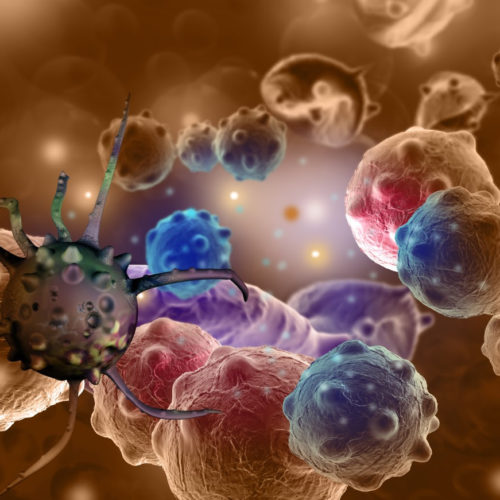By Nick Lavars Pancreatic cancer is the deadliest form of cancer with a five-year survival rate of just five percent, well behind that of many common cancer types. Scientists working to improve the odds have made an exciting breakthrough, finding that a peptide taken from the foot-and-mouth-disease virus naturally zeroes in on the majority of...
Tag: <span>Pancreatic cancer</span>
Pulling the plug on calcium pumps — potential new treatment strategy for pancreatic cancer
PANCREATIC CANCER RESEARCH FUND UK scientists have identified a new way to kill pancreatic cancer cells by ‘pulling the plug’ on the energy generator that fuels calcium pumps on their cell surface. The study, published in the British Journal of Cancer, reports how switching off the cancer’s energy supply causes the pancreatic cancer cells to...
Mechanisms help pancreatic cancer cells avert starvation
NYU LANGONE HEALTH / NYU SCHOOL OF MEDICINE A new study reveals the mechanism that helps pancreatic cancer cells avoid starvation within dense tumors by hijacking a process that pulls nutrients in from their surroundings. Led by researchers at NYU Grossman School of Medicine, the study explains how changes in the gene RAS — known...
Tropical flower offers potential new route for treating pancreatic cancer
UNIVERSITY OF BATH An international team of scientists led by the University of Bath have made drug-like molecules inspired by a chemical found in a tropical flower, that they hope could in the future help to treat deadly pancreatic cancer. Pancreatic cancer is one of the most aggressive and deadly cancers Around 10,000 patients in...
New path forward for pancreatic cancer treatment
Pancreatic cancer is one of the most aggressive cancers – by the time most cases are diagnosed, the cancer is advanced and spreading to other parts of the body. But what if these spreading cancer cells could, in fact, hold the key to guiding better treatment? Dr. Omid Faridani, recipient of the 2019 Pathfinders Award,...
‘Magic bullet’ takes aim at pancreatic cancer
by University of South Australia Axial CT image with i.v. contrast. Macrocystic adenocarcinoma of the pancreatic head. Credit: public domain Every day, more than 1200 people worldwide are told they have pancreatic cancer. Within 12 months, 80 per cent of them will have succumbed to the disease. It’s one of the most lethal cancers in the...
Silencing RNA nanotherapy shows promise against pancreatic cancer
by University of South Florida Despite advances in cancer survival, more than 90 percent of people with pancreatic cancer die within five years. Most patients with pancreatic tumors (and half of those with colorectal cancers) carry a mutation in the KRAS gene, which normally controls cell growth and death. The KRAS oncogene was discovered more...
Scientists have identified the presence of cancer-suppressing cells in pancreatic cancer
by Nagoya University A research team led by Nagoya University has revealed that cells containing a protein called Meflin have a role in restraining the progression of pancreatic cancer, a type of cancer that is hard to treat with traditional anti-cancer drugs. The team has also shown that cancer progression can be limited by artificially...
Fungal invasion of pancreas creates cancer risk
by Greg Williams, NYU Langone Health Certain fungi move from the gut to the pancreas, expand their population more than a thousand-fold, and encourage pancreatic cancer growth, a new study finds. Published online in Nature October 2, the study is the first to offer strong evidence that the mycobiome—the local mix of fungal species in...
Why Can’t We Stop Pancreatic Cancer?
There is little a person can do to prevent it, and there is nothing comparable to mammography or colonoscopy to screen for it when it is most amenable to cure. Pancreatic cancer, which will be diagnosed in about 56,770 people in the United States this year, is the only cancer with a rising mortality rate...

